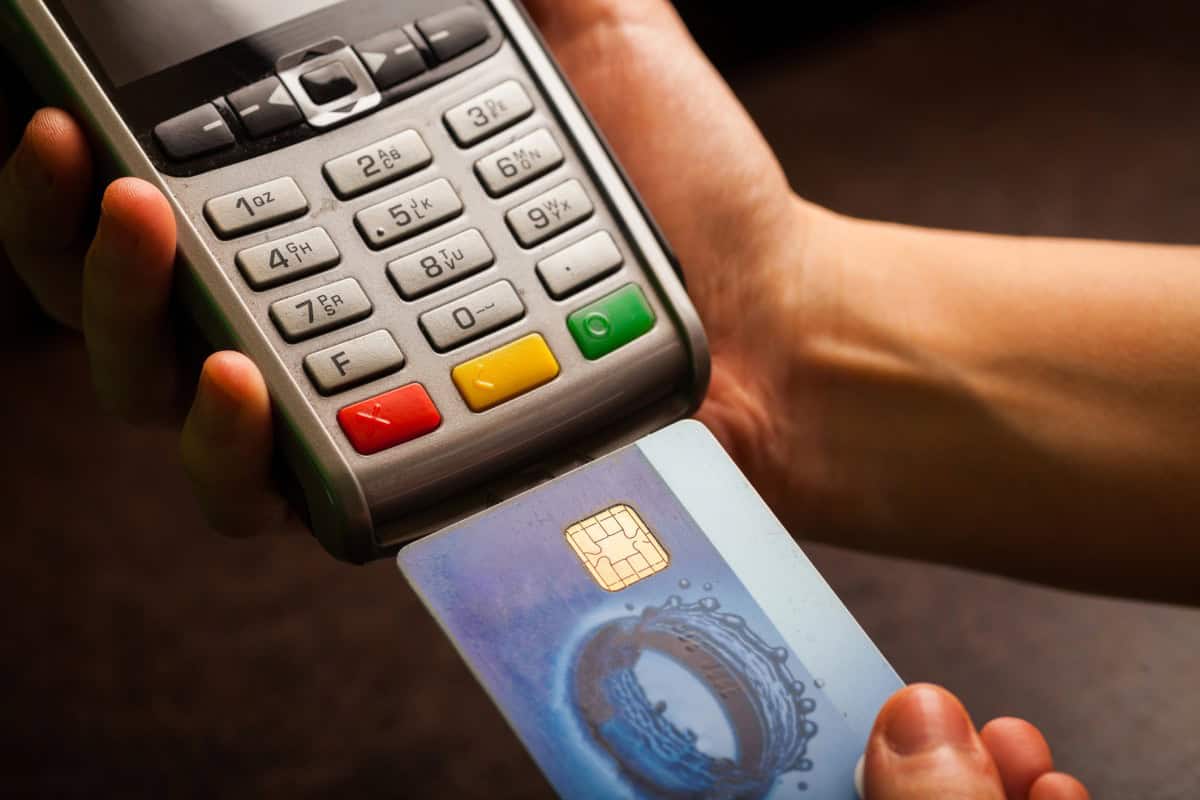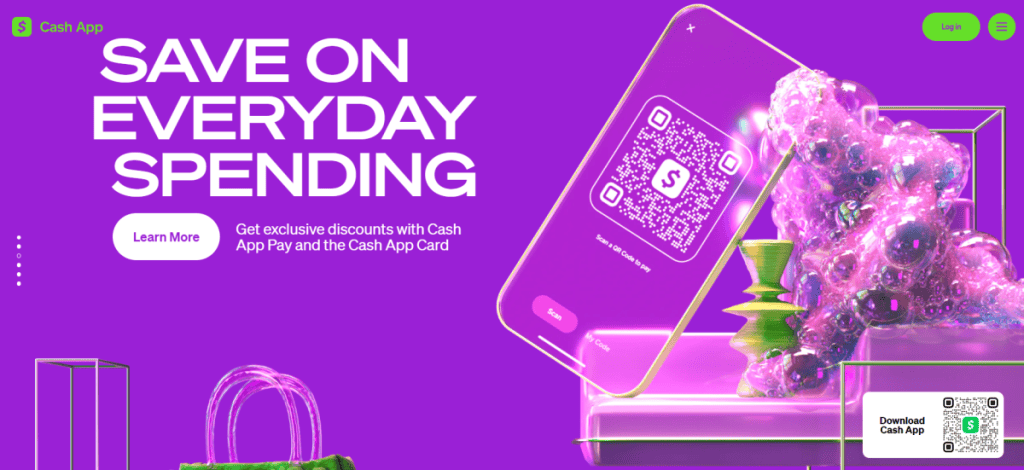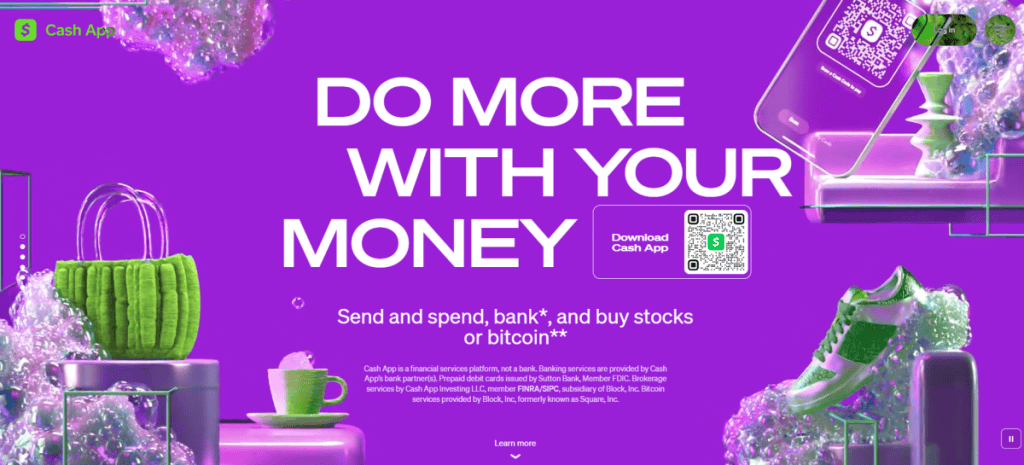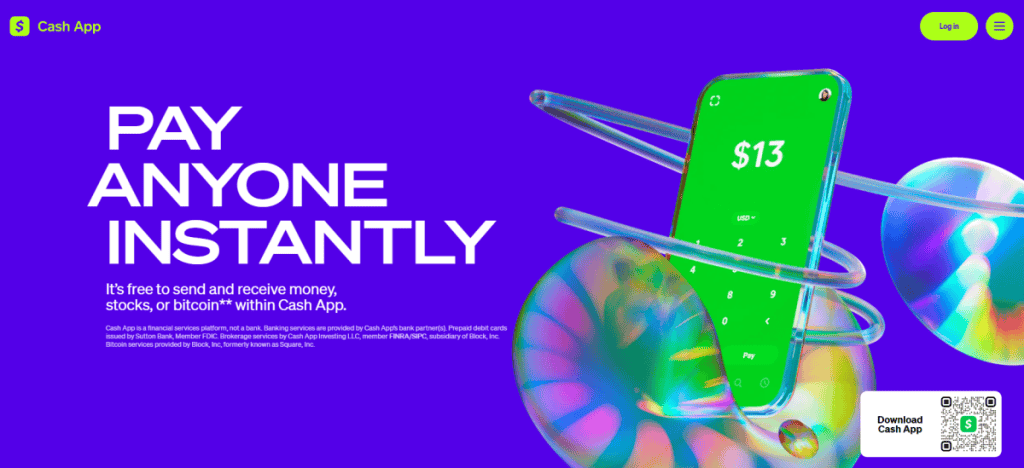
Cash App Review
- 27th Sep, 2024
- | By Linda Mae
- | Reviews
Originally introduced as Square Cash in 2013 by Block, Inc. (formerly Square), Cash App has transformed into a comprehensive financial resource that provides more than just person-to-person transactions. Originally created as a basic tool for sending and receiving money, Cash App soon broadened its offerings to include options such as banking, investing, and trading cryptocurrency. Let’s delve deeper into the Cash App Review.
At the heart of Cash App, it is still a peer-to-peer payment platform that enables users to easily send money by inputting a recipient’s $Cashtag, phone number, or email address. Customers have the option to connect their bank accounts or credit/debit cards in order to finance transactions. Although most transfers are free, there is a 3% fee for credit card transactions.
Cash App’s functionality has grown over the years. One of the most notable additions is the Cash Card, a customizable debit card linked to the user’s Cash App balance. This card can be used for in-store and online purchases, and users can also withdraw cash from ATMs. To enhance its appeal, Cash App introduced “Cash Boosts,” which offer discounts when using the Cash Card at selected merchants.
In 2019, it grew its services to include investments, enabling users to trade stocks and ETFs with zero commission fees. It also launched trading for digital currency, with emphasis on Bitcoin, enabling users to purchase, trade, or retain the cryptocurrency within the application. This characteristic attracts users who want to expand their financial portfolio without using a different platform.
Despite its wide array of features, Cash App is not a bank. It partners with FDIC-insured banks to provide its financial services, ensuring that users’ balances are protected. The app’s versatility, ease of use, and integrated banking and investing features have made it one of the most popular financial tools in the U.S. and the U.K.
Key Features of Cash App | Cash App Review
Cash App offers a range of key features that make it a versatile financial tool, from simple peer-to-peer payments to more advanced options like investing and cryptocurrency transactions. Below is an overview of its most significant features.
Sending and Receiving Payments
One of Cash App’s core functions is facilitating quick and easy money transfers between users. Sending and receiving payments is straightforward—users can transfer money instantly by entering the recipient’s $Cashtag, phone number, or email. This service is free for standard transfers, and it supports international payments between the U.S. and the U.K., offering a convenient way for users in these countries to exchange money.
Cash Card (Debit Card)
The Cash Card is a debit card connected to a user’s Cash App balance that can be customized for free. Users have the ability to buy items from any store that takes Visa, whether it be online or in person. Moreover, the card allows for cash withdrawals from ATMs, but incurs a $2.50 charge per transaction unless the account holder has established monthly direct deposits exceeding $300, in which case the fee is waived. Customers have the ability to customize their card with various designs, setting it apart from typical bank cards.
Cash App for Teens
For users aged 13 to 17, Cash App offers a special version of the Cash Card with parental supervision. Parents can monitor and manage their teen’s spending, while teens get access to a limited version of Cash App, allowing them to send and receive money and use their Cash Card at approved retailers. Safety measures include spending limits and category restrictions, ensuring the card is used responsibly.
Investment and Stock Trading
Thanks to the option to buy fractional shares, users of Cash App can invest in stocks and ETFs with just $1. The platform also enables users to set up automated investments for scheduling regular purchases of stocks. This feature is perfect for novice investors seeking a straightforward, cost-free method to begin investing.
Cryptocurrency Support
In addition to stock trading, it supports Bitcoin transactions. Users can buy, sell, or hold Bitcoin within the app. The platform also allows users to send Bitcoin directly to other wallets, making it a flexible option for cryptocurrency enthusiasts.
Cash Boost
Cash Boost is a rewards feature that offers discounts when using the Cash Card at partner retailers. Users can select one Boost at a time, which applies instant discounts to purchases at select merchants, such as restaurants or popular stores, further enhancing the appeal of using the Cash Card.
Banking Features of Cash App
It provides various convenient banking services, expanding its functionality beyond just a payment app for individuals. By incorporating features like direct deposit and a savings account, it offers users an easily manageable way to handle their financial matters.
Direct Deposit
One of the standout banking features of Cash App is its direct deposit option, which allows users to receive their paychecks up to two days early. This feature can be especially useful for individuals who need faster access to their earnings. It provides users with routing and account numbers, which can be used to set up direct deposits with employers. Once set up, funds are deposited directly into the user’s Cash App account, which they can then spend using their Cash Card or transfer to a linked bank account.
Savings Account
It also provides a feature for high-yield savings accounts, giving users up to 4.50% APY (Annual Percentage Yield). This attractive interest rate enables users to increase their savings more efficiently compared to conventional bank accounts. The savings account is smoothly connected to the Cash Card, allowing users to conveniently use their savings for transactions or to withdraw money as necessary. This capability allows Cash App users, especially those seeking a more adaptable option to traditional banking, to save money conveniently and effortlessly.
These banking features, combined with the ease of use that Cash App is known for, provide users with a simple yet comprehensive financial management tool. Whether you’re looking for early access to your paycheck or a convenient way to grow your savings, Cash App’s banking options are designed to meet those needs efficiently.
How Cash App Stands Out
It distinguishes itself in the crowded world of mobile payment apps by offering a combination of no-fee services, simplicity, and flexibility in managing funds. This mix of features makes it particularly appealing to a broad range of users, from casual spenders to those looking for more advanced financial management options.
No Monthly Fees
One of Cash App’s most attractive features is its lack of monthly maintenance fees. Unlike traditional banking services, it users don’t have to worry about paying fees for maintaining an account, overdrafts, or meeting minimum balance requirements. This makes it a cost-effective option for those looking to avoid the various charges often associated with other financial institutions. The only fees Cash App charges are for specific actions, such as funding an account with a credit card (which incurs a 3% fee) or making instant transfers, which come with fees ranging from 0.5% to 1.75%, depending on the transaction.
Ease of Use
Cash App stands out because of its easy-to-use and user-friendly interface. Establishing payments, moving funds, or getting access to money is simple and easy. Users have the ability to swiftly send or ask for money by providing simple details such as a recipient’s $Cashtag or phone number. The app is made for users to easily navigate, including those who are not familiar with digital banking or payment platforms. Cash App’s simple design allows users to easily make transactions with just a few taps.
Flexibility with Cash Deposits and Withdrawals
Cash App provides flexibility when it comes to managing cash. Users can deposit physical cash into their Cash App account at participating retailers such as Walmart and Walgreens. In terms of withdrawals, Cash App allows users to withdraw funds from ATMs, though a fee of $2.50 applies for each transaction unless users have set up direct deposit, which waives this fee for up to three ATM withdrawals per month. These options provide added convenience, allowing users to manage both digital and physical money effortlessly.
Fees and Costs
It maintains its appeal by offering a range of free services, but it does charge fees for certain transactions, especially when users require faster transfers or more convenience. Understanding these fees can help users minimize costs and make the most of Cash App’s services.
Transaction Fees
Cash App enables users to freely send and receive money through their bank accounts or debit cards. Nevertheless, if you make payments using a credit card, you will be charged a 3% fee for the transaction. This cost is quite common on most payment platforms, although it can become significant for users who often use credit cards for transactions. It provides a quick option for users to transfer their funds instantly to a linked bank account or debit card when they require immediate access to their money. The fees for these immediate transfers range from 0.5% to 1.75% of the transferred amount, with a minimum fee of $0.25.
ATM Withdrawals
For users withdrawing cash with the Cash Card, It charges a $2.50 fee per ATM transaction. In addition to Cash App’s fee, users may also be subject to additional fees from the ATM provider. However, this fee can be waived if users have direct deposits of $300 or more into their Cash App account each month. In this case, it offers up to three free ATM withdrawals per 31-day period, making it a valuable option for users who need regular access to cash.
Cost-Saving Tips
To avoid unnecessary fees, users can opt for standard deposits instead of instant transfers. Standard transfers are free and typically take 1-3 business days to complete. Additionally, users should consider funding transactions with a debit card or bank account to avoid the 3% fee charged on credit card payments. By utilizing direct deposit, users can also take advantage of the fee waivers on ATM withdrawals, further reducing costs.
Security and Privacy Features
It prioritizes security and privacy by implementing multiple measures to safeguard users’ accounts and data. These characteristics enhance the security of the platform when it comes to managing financial transactions, including peer-to-peer payments and investments in Bitcoin and stocks.
Account Security
Cash App ensures the security of user accounts by offering several layers of protection. One key feature is the ability to enable PIN or fingerprint authentication, adding an extra barrier before any transaction is processed. This provides peace of mind for users who want to ensure that unauthorized individuals cannot access their accounts or funds. Additionally, Cash App allows users to withdraw Bitcoin to external wallets, a feature that not only provides flexibility but also ensures that their cryptocurrency assets are stored in more secure locations if they prefer to use personal wallets rather than keeping funds on the platform.
Fraud Protection
Preventing fraud and scams is a main focus for Cash App. Sophisticated fraud detection technologies are used by Cash App to ensure the safety of users. The application tracks transactions and identifies any questionable behavior, automatically voiding transactions that appear potentially fraudulent. Although the platform is susceptible to scams, particularly those conducted outside the app like phishing, it actively seeks to reduce risks. Users are also urged to activate the optional Security Lock function, necessitating users to input their PIN for each transaction, providing an additional level of security.
Data Privacy
Cash App also prioritizes data privacy through encryption and secure communication protocols. All data sent through the app is encrypted, ensuring that both personal information and financial data are protected from unauthorized access. Cash App uses these protocols for both public and private connections, meaning user data remains secure whether they’re using a public Wi-Fi network or mobile data.
Pros and Cons of Cash App
Cash App has become a popular platform for peer-to-peer payments, offering a mix of banking, investing, and cryptocurrency features. While it’s packed with useful tools, it also has some limitations. Here’s a breakdown of the pros and cons.
Pros
Cash App’s ease of use for peer-to-peer transfers is one of its greatest benefits. Individuals have the ability to quickly send and receive money by simply tapping a few times, making it a perfect option for fast payments between loved ones. Standard transfers and basic features do not incur fees, saving money for users who do not require immediate access to funds. Moreover, Cash App differentiates itself by offering investment and cryptocurrency trading services on a single platform. Users have the ability to purchase portions of stocks or ETFs with only $1, and they can also trade Bitcoin without the need for a different app or account. The platform’s special characteristics, like Cash Boosts that offer discounts at specific stores with the Cash Card, and early direct deposit, enhance its benefits.
Cons
Despite these advantages, Cash App has some notable downsides. Its customer service options are limited, with no direct phone support, which can be frustrating for users who encounter issues. Instant transfers, while convenient, come with fees that range from 0.5% to 1.75%, which can add up for frequent users. Additionally, while Cash App supports Bitcoin, it is currently the only cryptocurrency available, limiting options for users interested in trading other digital currencies. Lastly, the $2.50 ATM withdrawal fee can accumulate unless users receive direct deposits of $300 or more each month, which qualifies them for fee-free withdrawals at select ATMs.
Comparison with Competitors
Cash App is a popular payment platform, but it’s not without competition. When compared to other major players like Venmo, PayPal, and Zelle, Cash App stands out in some areas while falling short in others. Here’s how it stacks up.
Cash App vs. Venmo
Both Cash App and Venmo are designed for easy peer-to-peer payments, providing a user-friendly experience. Nevertheless, there are slight variations in fees and limits. Venmo also levies a 3% fee on credit card transactions, just like Cash App, though it does not provide services for Bitcoin trading or stock investments as Cash App does. Cash App keeps transactions private while Venmo has a more socially integrated interface that enables users to share payments on a public feed. Cash App permits verified users to send a maximum of $7,500 per week, whereas Venmo has a weekly limit of $4,999. In general, Venmo may attract users seeking a social payment experience, while Cash App provides a wider range of financial services.
Cash App vs. PayPal
PayPal is a more established platform and offers a wider range of services, including international payments to over 200 countries, compared to Cash App’s limited U.S. and U.K. scope. PayPal also supports multiple currencies, making it a go-to platform for businesses and global users. Cash App, on the other hand, shines with its fee structure for domestic transactions, offering free transfers between users and a simple interface. PayPal charges higher fees, particularly for cross-border transactions and currency conversions. However, PayPal’s customer service options are more robust, including phone support, whereas Cash App’s customer service is mostly limited to email and chat.
Cash App vs. Zelle
Zelle is another strong competitor, particularly for users seeking fast, fee-free bank transfers. Zelle integrates directly with bank accounts, making transfers nearly instant and free, unlike Cash App, which charges fees for instant transfers. However, Zelle lacks the broader functionalities of Cash App, such as the ability to invest in stocks or trade Bitcoin. Zelle is best for users who want a simple, no-fee solution for transferring funds directly from one bank to another, while Cash App provides more comprehensive financial services.
Who is Cash App Best Suited For?
Cash App provides a wide range of functions designed for diverse users, making it a flexible resource for a variety of financial requirements. Cash App offers specific advantages suited to your financial habits, whether you are a teenager, a casual investor, or a freelancer.
Teens and Young Adults
Cash App is particularly well-suited for teens and young adults due to its straightforward interface and features like the Cash Card. This free, customizable debit card allows users to make purchases online and in stores, withdraw money from ATMs, and even earn discounts through Cash Boosts. Cash Boosts offer instant savings when using the Cash Card at participating retailers, which can include popular restaurants and clothing stores. For teens, there are parental controls to monitor spending, making it a safe and flexible option for managing money.
Casual Investors
For those who are interested in starting to invest, Cash App offers a user-friendly platform for beginners. Casual investors can now begin investing with as little as $1 by purchasing fractional shares of stocks and ETFs. The straightforward layout of the app allows users to monitor their investments easily, with no trading fees, making it perfect for beginners. Furthermore, Cash App also facilitates Bitcoin transactions, enabling users to purchase, sell, or keep Bitcoin directly within the app without the requirement of a separate cryptocurrency platform, making it ideal for those intrigued by cryptocurrency but hesitant to engage in more complex trading platforms.
Freelancers and Small Business Owners
Freelancers and individuals with small business ventures can also take advantage of Cash App. The system enables users to effortlessly receive payments from clients or customers through Cash for Business. Business owners have the ability to generate a distinct $Cashtag to provide to customers for quick and easy transactions. It is especially beneficial for mobile or small businesses that require a convenient way to handle payments while on the move, eliminating the necessity of a traditional POS system.
Conclusion
To sum up, Cash App provides a user-friendly interface with benefits such as zero monthly fees, opportunities for investing in cryptocurrency, and convenient payment options like the Cash Card. Nevertheless, there are constraints like charges for immediate transfers and restricted customer support. This is perfect for those who use it casually, new investors, and small business proprietors.
FAQs
Can I use Cash App for international transfers?
Currently, it supports payments between users in the U.S. and U.K. only. International transfers beyond these two countries are not available.
How do I avoid fees with Cash App?
To avoid fees, opt for standard transfers instead of instant transfers and avoid using a credit card to fund your account, as this incurs a 3% fee.
Is Cash App safe to use for Bitcoin transactions?
Yes, Cash App is safe for Bitcoin transactions, but for added security, it’s recommended to withdraw Bitcoin to an external wallet.



